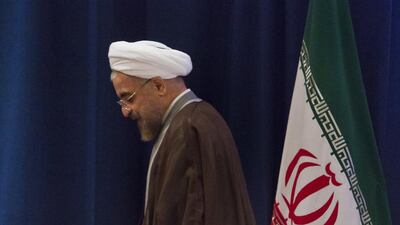As the hours ticked down to the November 24 deadline to strike a final deal with Iran over its disputed nuclear programme, US secretary of state John Kerry spoke with the foreign ministers of each Arabian Gulf country to update his worried allies.
Though they had been denied even an observer’s role in the talks, Kerry would have tried to reassure them that the US would seek to block every possible path to an Iranian nuclear weapon, and that rapprochement was not Washington’s strategic goal.
“The stakes are high, the issues are complicated and technical, and if we are, in fact, to cut off all the pathways through which Iran could obtain enough fissile material for a bomb, every detail matters enormously,” Kerry said, likely echoing the sentiments he delivered to Gulf officials. “But it also takes time because we will not settle for just any agreement. We want the right agreement.”
See all our Year in Review coverage
In the end, the deadlocked talks were finally extended by seven months; the Gulf reaction, however, was muted – a stark shift from the deep scepticism expressed by officials after their closest ally held secret talks with common foe Iran to initiate a process that could radically alter the regional status quo and unleash Iran's foreign policy ambitions at their expense.
Does this shift suggest that Kerry has been able to sufficiently address the GCC fears about the negotiations with Iran? On some counts yes, regional observers say, but on many others significant differences remain. Gulf officials – most recently former Saudi foreign minister Turki Al Faisal, in October – have said that they will pursue the same terms for their own nuclear programmes that are finalised with Iran.
But most analysts agree that a destabilising nuclear arms race would only kick off if there were signs that Iran had decided to cross the threshold and race for a bomb.
The overriding concern in Gulf capitals is that the deal will do nothing to address Iran's strategy of supporting destabilising forces in Arab countries – either opposition political and militant groups in Yemen and Bahrain, or rulers like Bashar Al Assad in Syria – and that friendlier relations between Tehran and Washington could even empower Iran in the region. The US desire to shift resources and focus to east Asia even fuelled fears that Barack Obama hoped to make Iran the regional power in the Middle East.
Washington’s military commitment in the war against ISIL as well as the scale of arms sales and military cooperation have quelled some of those fears in the Gulf, but questions remain over whether Iran will be forced to offer any concessions on regional behaviour in exchange for a deal that eased pressure on its economy and improved relations with the international community. In Washington, there is a dismissive attitude among US officials regarding these concerns and they are viewed as an attempt to undermine the talks.
Analysts also do not see normal relations between Iran and the US emerging if a deal is struck, for both domestic political and strategic reasons. “A nuclear deal would not make for friendship between Iran and the West,” wrote Mark Fitzpatrick, the director of the non-proliferation and disarmament programme at the International Institute for Strategic Studies.
But among Gulf officials, there may also be a realisation that economic sanctions tied to the nuclear issue have done virtually nothing to stop Iran from pursuing its regional goals.
If the nuclear deal empowered Iran’s more moderate elected leaders, Gulf countries “would be very willing to engage with the Iranians”, said F Gregory Gause, head of the international affairs department at Texas A&M University. “But I just don’t think a deal is necessarily going to lead to a change in Iranian regional behaviour – those are two separate files.”
While Gulf countries do not have uniform policies toward Iran, the extension of the talks has led to what some say is a more optimistic attitude because the worst-case outcome – a bad deal made by a US administration desperate for a foreign-policy victory – was averted and that the US would hold out. “What makes them more at ease … is that … the US seems to be really holding steadfast to its position on Iranian concessions,” said Imad Harb, a Gulf analyst with the National Council on US-Arab Relations.
The outstanding issues reportedly are the number of enrichment centrifuges that Iran can keep, lack of agreement on opening Iran’s military sites to nuclear inspectors, how fast sanctions will be lifted and how long an accord would remain in effect.
The US commitment to the military campaign against ISIL, and its close coordination with Gulf allies in the fight, has addressed concerns that the US was disengaging from the region. “The issue of ISIS is proof the US cannot leave the region because it has too much responsibility for it,” Harb said.
Still, others say the Gulf-US relationship is slowly evolving as a result of American policies in the region over the past decade. The GCC countries are looking to diversify security relationships and are acting more assertively than at any time in their histories to pursue regional interests.
See all our Year in Review coverage
Taimur Khan is a foreign correspondent for The National based in New York.

